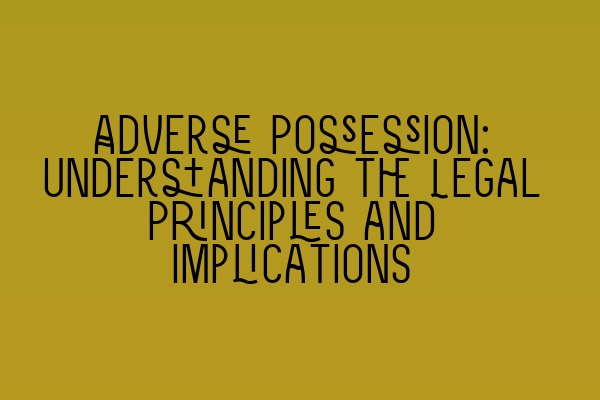Adverse Possession: Understanding the Legal Principles and Implications
Adverse possession is a legal principle that can have significant implications on property ownership. It allows a person to acquire ownership of a property by occupying it openly and without permission for a specified period of time. This concept has been the subject of much debate and controversy, with various legal intricacies surrounding its application. In this article, we will explore the fundamentals of adverse possession, its legal principles, and the implications it holds for property law.
What is Adverse Possession?
Adverse possession refers to a process whereby someone who is not the legal owner of a property can become the owner through continuous and uninterrupted occupation for a certain period of time. This principle is based on the idea that if a person openly takes possession of a property and treats it as their own for an extended period, they should be rewarded with legal ownership.
The length of time required for adverse possession varies depending on the jurisdiction. In the UK, for example, the required period is typically 12 years, but it can differ in certain circumstances. It is important to consult with a qualified property law solicitor to understand the specific laws and regulations that apply to your situation.
Legal Principles of Adverse Possession
In order to successfully claim adverse possession, certain legal principles must be satisfied. These principles vary slightly between jurisdictions, but generally include the following:
- Actual Possession: The occupier must physically possess the property and treat it as their own. Mere intentions or occasional visits will not be sufficient to establish adverse possession.
- Open and Notorious Possession: The occupation must be conspicuous and obvious to anyone with an interest in the property. It should not be covert or hidden.
- Exclusive Possession: The occupier must possess the property exclusively, meaning that no other person has rights to occupy or use the property during the adverse possession period.
- Hostile Possession: The possession must be without the permission or consent of the legal owner. This does not necessarily imply ill intentions, but rather a lack of express permission.
- Continuous Possession: The occupation must be continuous throughout the required period. Any gaps or interruptions in possession may disrupt the claim of adverse possession.
It is essential to meet all of these legal principles to successfully claim adverse possession. Failing to satisfy any one of them can result in the rejection of the claim, underscoring the importance of seeking legal advice to navigate this complex area of property law.
Implications of Adverse Possession
The implications of adverse possession can be far-reaching and impact both property owners and those seeking to claim adverse possession.
For property owners, vigilance is crucial. It is vital to regularly inspect and monitor your property to ensure that no one is occupying it without your consent. In cases where adverse possession claims have been established, the legal owner can lose their rights to the property, including the right to sell or use it as they wish.
On the other hand, those seeking to claim adverse possession must navigate a complex legal process. It is essential to gather evidence to support the claim, including documentation of continuous and uninterrupted possession, as well as proof of meeting all the necessary legal principles. Engaging a property law solicitor experienced in adverse possession cases is highly recommended to increase the chances of a successful claim.
Conclusion
Adverse possession is a complex legal principle with significant implications for property ownership. Understanding the legal principles and requirements is essential for both property owners and those seeking to claim adverse possession. If you believe you may have a valid claim or need advice on protecting your property rights, consult with a qualified property law solicitor to ensure you are equipped with the necessary knowledge and guidance.
For more information on property law or to prepare for your SQE exams, be sure to check out our related articles:
